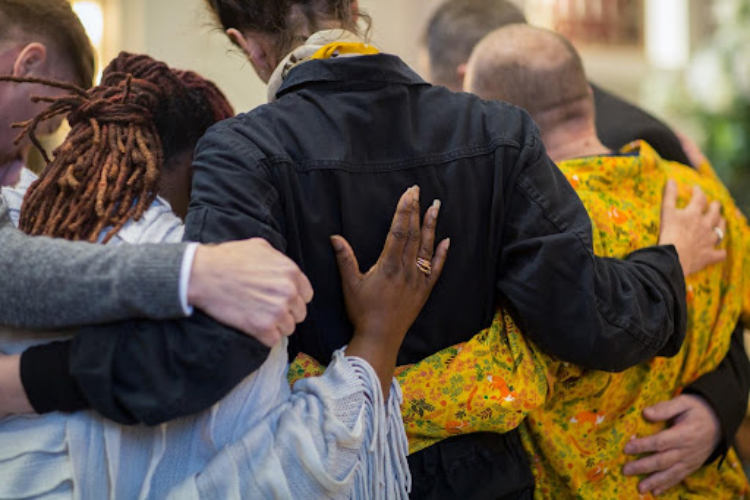Anticipatory loss or grief is the emotion a person feels while preparing for an upcoming loss, such as the death of a loved one.
Inevitably, all of us will experience this type of grief at some point in our lives. Anticipatory grief is common among individuals whose loved ones are going through a terminal illness or degenerative disease such as cancer or Alzheimer’s.
This can also be experienced as adult children witness their parents go through aging. In addition to the loss of a family member or friend, this type of anticipatory grief can be felt in other ways, for example, if a family pet is nearing the end of its life or if someone is preparing for an out-of-state move away from all things familiar.

Anticipatory grief may also happen when a person receives news about their health prognosis, such as someone being told they have a terminal illness or when a pregnant mother is given the news that her baby may have serious health complications.
No matter the circumstance, it is important to note that anticipatory grief will be felt before a person passes or an event takes place, which makes processing it different from the common form of grief we experience after a loss occurs.
What Does Anticipatory Grief Feel Like
Some common feelings or behaviors of individuals experiencing anticipatory grief include:
- Anger
- Anxiety
- Denial
- Depression
- Irritability
- Inability to think of things other than the impending loss
- Guilt
- Lack of motivation
- Loneliness
- Shock
- Tearfulness
- Withdrawal from preferred activities or socialization

The Stages of Anticipatory Grief
There is no set way for a person to move through the grieving process; however, according to the University of Rochester Medical Center, there are four distinct phases that one may experience if they are dealing with anticipatory grief.

1. Acceptance that death is inevitable
One may feel sadness or depression during this phase.
2. Feeling concern for the dying person
Family and friends may experience regret during the phase, feeling sorry for past arguments or failed relationships. If someone is dealing with their impending death, this stage may translate to a fear of dying.
3. Rehearsing the death
During this phase, a person may become focused on what will happen immediately after death. This can include saying goodbye, planning funeral arrangements, and preparing for the loss.
4. Imagining the future
Survived loved ones may think about what their lives will be like when a family member or friend passes away. What will the holidays be like? Will special occasions continue? Will traditions stay the same?
For a dying person, this phase will be similar, as they think about what life might be like for their loved ones when they are no longer around. They may even be thinking about their own experience with death and what will happen during this process.

How to Manage Feelings of Anticipatory Grief?
With anticipatory grief, one has a unique opportunity to prepare to manage their grief. There can be both positives and negatives when dealing with anticipatory grief.
Ideal Way To Deal With Anticipatory Grief
One of the most important things to do if you are experiencing this type of grief is to talk to someone, a friend, a loved one, or a therapist.
Holding your emotions will only lead to feelings spilling over into other environments, such as at work or with family members.
Little Research Is Helpful
Figuring out what to expect can be a helpful technique. For example, if your loved one receives a cancer diagnosis, you may want to learn about available treatments and outcomes, potential side effects, survival rates, how to be a positive support in their lives, and how to help them focus on their life’s quality.
The sudden death of a family member can be difficult for the remaining family members to adjust to. Still, some positive impacts may be felt if the deceased had time to prepare things, like who will manage finances or who will care for young children.

Therapy For Anticipatory Grief
Common forms of therapy that aid in working through anticipatory grief are cognitive behavior therapy and narrative therapy.
Cognitive Behavior Therapy/CBT
Cognitive behavior therapy is more skill-based and will help a grieving person learn ways to shift their mindset to something more positive.
Narrative Therapy
Narrative therapy will allow grieving people to have the time and space to talk through their experiences of grief.
Both types of therapy focus on helping grieving people reframe their experiences to manage difficult emotions better.
A grief and loss therapist can provide appropriate space for you to talk through your grief, find comfort, and achieve a sense of acceptance for the anticipated loss. The therapist will also be able to provide support and guidance once the loss takes place.
Don’t hesitate to reach out to Ammirati Counseling to ask and inquire about support services that you can receive to help with overcoming feelings of depression, loneliness, stress or anxiety.
Ammirati Counseling is a boutique counseling group with an office in Bannockburnn serving Chicago. Therapists also offer private therapy via remote online. They provide comprehensive care to children, teens, adults, couples, families, and the LGBTQ community.
Terri specializes in empowering clients to strengthen their relationships. She works with all aspects of relational distress and provides solution-focused therapy.
- Gottman Couples Therapy: Key Principles And What You Can Do Now - June 17, 2024
- Healing From Trauma: 3 Ways To Take Control - June 3, 2024
- Signs & Symptoms of Depression In Men - May 20, 2024

